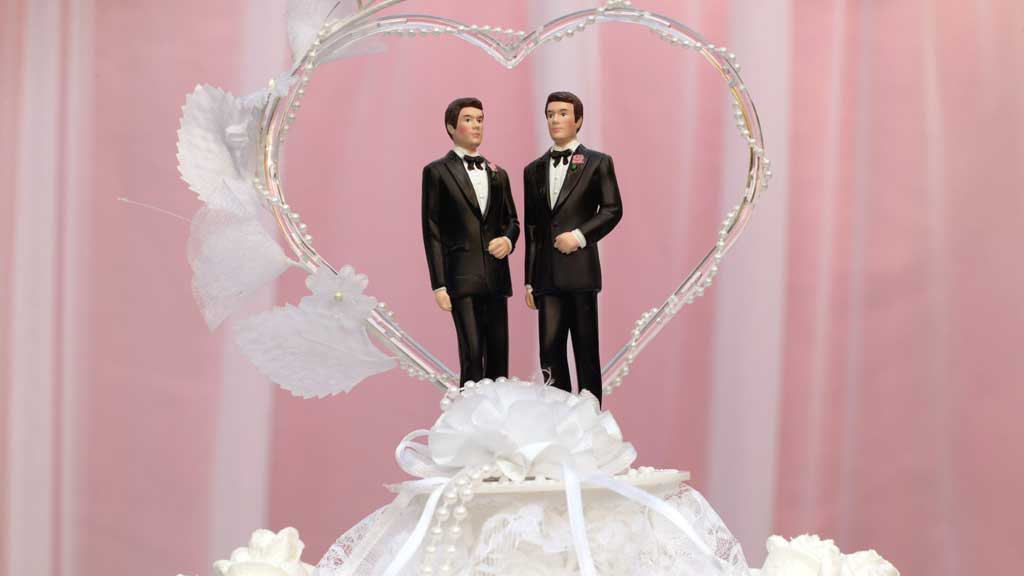We are so gay: planning a same-sex wedding
Two grooms on the cake, two aisles in the venue, and plenty of champagne: what’s on the to-do list ahead of the first gay weddings in England and Wales this week.

Planning a wedding is a big deal. In fact, it’s so big that most couples get sick of it part way through: a recent study for the Huffington Post found that three-quarters of couples said “let’s just elope” at some point in the build-up to the big day.
It’s also big business. Experts believe the UK wedding industry is worth £10bn annually.
So England and Wales saying “I do” to equal marriage on 29 March, when the first gay weddings will be held, is a big moment.
For many gay couples though, it’s more of the same: while equal marriage comes into force this week, many same-sex duos have celebrated their civil partnerships in much the same way as weddings for years. The Gay Wedding Show, for example, has been running for a decade.
But those involved in the gay wedding industry agree that equal marriage will be a further boost.
I would consider converting to a wedding – if we did, we would throw a party again! Richard Gough-Buijs, author, Ooh Yes I Do!
Richard Gough-Buijs is the author of Ooh Yes I Do! The Ultimate Gay and Lesbian Wedding Planner. He said in recent months demand has escalated for the book, which he wrote after planning his own same-sex wedding in 2011.
“I think equal marriage is a great achievement, although in a way it’s just the name that’s different [to a civil partnership],” he told Channel 4 News.
“I would consider converting over to a wedding – if we did it we would throw a party again!”
Gay marriage: the key questions
Because the gay wedding industry is well set up already, Mr Gough-Buijs said a lot of the logistical considerations of hosting a same-sex ceremony have already been taken care of by enterprising businesses.
“Lots of cake makers do a lot of same-sex cake toppers, and they’re amazing,” he said. “Otherwise it’s pretty much the same – engagement rings, wedding rings, a suit or a dress.”
One issue for lesbian couples is whether they both want to walk down the aisle, in the same way as a traditional bride – in which case, if they want to walk together, do they need two aisles?
The main difference, as we found when we organised our wedding, is that as a gay couple and a lesbian couple, both of you are in the spotlight. Richard Gough-Buijs
“It is all possible,” said Mr Gough-Buijs. “Any couple can arrange that with a registrar. And they can choose who walks them down the aisle… The main difference, as we found when we organised our wedding, is that as a gay couple and a lesbian couple – with two men, and two women – both of you are in the spotlight.”
Andrew Jackson, the man behind the UK Gay Wedding Planner, agreed that gay weddings often follow the “traditional” wedding route, with a few key differences.
“Often grooms will wear different suits but then the same colour or pattern tie, or the same buttonhole. With brides, generally one bride will wear the ‘traditional’ white dress while the other wears a trouser suit,” he told Channel 4 News.
“The reception is like any wedding – generally champagne, canapes, photos followed by the wedding breakfast with speeches and then an evening reception with entertainment.”
He said gay weddings were as similar, or indeed as different, to any other straight wedding as one straight wedding could be from the next – from the colour scheme to the arguments (and, one imagines, the threats to elope).
“Most couples I’ve worked with have some idea at least how to manage their perfect day,” he said. “But when you start to break it down into individual elements, for example colour scheme, or choice of flowers, they generally seek advice – and sometimes start to disagree with each other!”